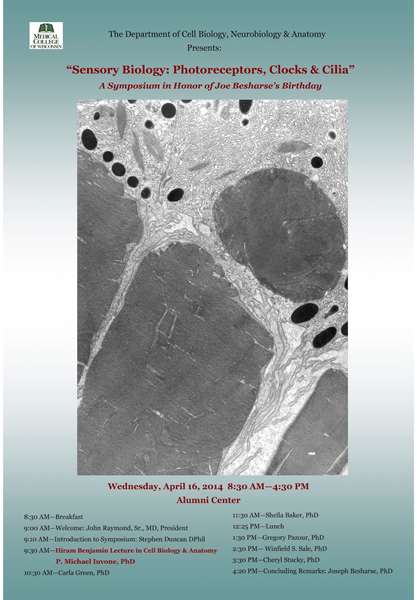
Joseph Besharse, PhD, FARVO
Professor Emeritus
Locations
- Medical College of Wisconsin Eye Institute
- 925 N. 87th St. Room 726
Milwaukee, WI 53226
Contact Information
Education
PhD, Zoology and Physiology, Southern Illinois University at Carbondale
MA, Zoology, Southern Illinois University at Carbondale
BA, Biology and Chemistry, Hendrix College, Conway, Arkansas
Biography
Honors and Awards
Besharse Distinguished Service Award MCW 2015
Besharse MCW Vitality Award
Besharse Dean's Senior Leader Spotlight 2014
Research Interests
- Cell biology of photoreceptor membrane turnover
- Cell biology of the retinal pigment epithelium

- Circadian biology of the retina
- Cilia, ciliogenesis and ciliopathies
- Photoreceptor degenerative diseases and macular degeneration
Funding for this research:
NIH/NEI R01 EY03222-31-36, J C Besharse (PI), The Visual Cell-Pigment Cell Interface and Disc Turnover
This grant is directed at the mechanisms involved in photoreceptor outer segment turnover.
NIH/NEI T32 EY014537-11-15, J C Besharse (PI), Research Training Program in Vision Science
This is a training grant in vision science for a group of senior and mid-level investigators, with active and competitive research programs funded through the National Eye Institute. The objective is to prepare trainees at the pre-doctoral level for research careers in ocular and vision research.
Joseph Besharse Lab
The current major focus of the laboratory is the role of ciliogenesis defects and circadian clocks in retinal diseases. This includes a particular focus on hereditary photoreceptor degeneration, macular degeneration and ciliopathies.
Our Team

Pictured left to right: Amy Ludwig-Kubinski, Amira Pavlovich, Sean Kundinger, Tylor Lewis and Joseph Besharse
Positions in the lab
Please email Dr. Joseph Besharse for information about current positions.
Research

“All of your organs have clocks — your liver, your heart, your kidneys all have their own internal clocks. And the big secret is how you mesh them all together and synchronize them so they work together instead of against each other."
--Dr. Besharse
Circadian Clocks

Figure 1: Diagram illustrating the relationship of the central clockwork (left) and clock regulated genes (right). Only the Per/Cry loop of the clock is illustrated. Clock regulated genes are downstream of the clock and involved in circadian function within cells.
Trafficking of Phototransduction Components in Photoreceptors
Turnover of photosensitive membrane throughout the life of a photoreceptor depends on maintenance of a delicate balance between photosensitive membrane assembly and degradation. These events are controlled by circadian clocks (see above). Both protein and lipid components are synthesized in the cell body and transported vectorially to the region of the sensory cilium where phototransduction organelle is assembled. The cilium is important in the transport of macromolecules from sites of synthesis in the cell body to the region of membrane assembly and in the morphogenesis of flattened discs.
Our current work is directed at a model called intraflagellar transport (IFT) in which microtubule based motors (dynein and kinesin) move protein complexes along microtubule tracks into and out of the cilium (see Figure 2). The IFT model is thought to apply to all motile and sensory cilium structures among the eukaryotes; IFT proteins are required for cilium assembly and are found widely in both motile and sensory cilia.

Figure 2. The components of intraflagellar transport as revealed in the green alga, Chlamydomonas.
Recent work in mice carrying mutations in genes encoding the kinesin II motor and the IFT complex protein, IFT88, demonstrate that this pathway is required for assembly of the phototransduction system in photoreceptors (see Figure 3).
Research in this laboratory is directed at organization of the IFT protein complex and its physical interaction with both cell specific cargo and with microtubule based motor proteins.

Figure 3. A model for intraflagellar transport in photoreceptors based on work of Pazour, et al., 2002.
News

The 2016 ARVO highlight for MCW was the Proctor Medal lecture, given on May 2 by Joseph C. Besharse, PhD. The Proctor Medal, one of ARVO’s most prestigious honors, recognizes excellence in the basic or clinical sciences as applied to ophthalmology.
Past Event
 Symposium in honor of Joe Besharse's Birthday, "Sensory Biology: Photoreceptors, Clocks & Cilia"
Symposium in honor of Joe Besharse's Birthday, "Sensory Biology: Photoreceptors, Clocks & Cilia"Wednesday, April 16, 2014

